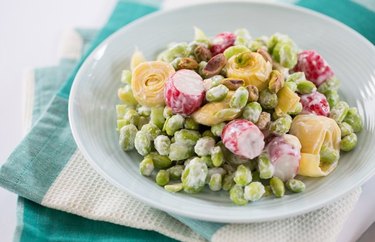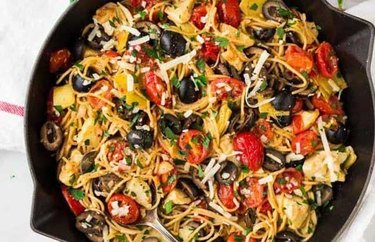
Artichokes originated from the Mediterranean and are a staple in the traditional diet, which tells us they're an especially good-for-you food.
You can buy fresh artichokes pretty much year-round, although they have two peak seasons: March through May and then again in October, according to the California Artichoke Advisory Board. Nearly 100 percent of all of the artichokes sold in the U.S. come from California.
Video of the Day
Video of the Day
The most common spot to shop for artichoke hearts is the jarred or canned food sections where they're typically packed in oil or brine.
For the latter, rinsing them with water will help remove some of the saltiness. You can also find frozen artichoke hearts in the freezer aisles of some grocery stores.
Health Benefits of Artichokes
1. They're Nutrient-Packed
One large artichoke has just 75 calories yet it manages to be a good source (provides 10 percent or more of the Daily Value) of iron, potassium, phosphorus, manganese, thiamin, niacin and choline.
The vegetable provides 20 percent or more of your daily needs of vitamins C and K, folate, magnesium and copper.
2. They're Loaded With Fiber and Protein
Vegetables in general are known to be a good source of fiber but you'd be hard-pressed to find one ranking as high as artichokes.
In fact, they tie with lima beans as the most fiber-filled veggies (by weight), according to the USDA. One large artichoke has almost 9 grams of fiber!
Surprisingly, they also contain protein, which is pretty rare for vegetables. The same serving of one large artichoke provides 5 grams of protein.
3. They're a Source of Prebiotics
Probiotics are the healthy bacteria that live in our guts and prebiotics act as fuel to help the probiotics flourish.
Artichokes, along with other foods like bananas, tomatoes and onion are a natural source of prebiotics, specifically fructooligosaccharides (FOS) and inulin, as explained by the Canadian Society for Intestinal Research.
4. They Pack Antioxidants
A January 2010 study in Nutrition Journal assessed the antioxidant contents of fruits and vegetables and found that artichokes, along with dried plums, dried apricots and curly kale ranked as some of the highest in antioxidant capacity.
High-Protein Canned Artichoke Heart Recipes
Pair artichokes with high-protein foods like eggs, chicken or legumes and you're on your way to a healthy and satiating meal that will keep you full for hours.
Enjoy these five artichoke heart recipes for breakfast, lunch or dinner — all with at least 10 grams of protein.
1. Vegan Artichoke and Edamame Salad

- Calories: 344
- Protein: 23 grams
This salad may be vegan but you don't have to be 100-percent plant-based to enjoy it. If you do eat dairy, try plain Greek yogurt in place of the soy yogurt called for here.
It's an interesting smattering of foods — edamame, pistachios, celery, artichoke hearts and radishes — but it works. The 23 grams of protein in this dish predominately comes from the edamame and artichokes.
Get the Vegan Artichoke and Edamame Salad recipe and nutrition info here.
2. Artichoke, Chicken and Corn Salad

- Calories: 373
- Protein: 25 grams
This salad has the perfect combination of foods, making it a standout lunch or dinner option. First, the macros are well-balanced — 49 percent carbohydrates, 27 percent protein and 24 percent fat.
It achieves this by combining a lean protein (chicken breast), a whole grain (corn), a healthy oil (olive oil) and a mix of vegetables like artichokes, leafy greens and onion.
Get the Artichoke, Chicken and Corn Salad recipe and nutrition info here.
3. Cauliflower Crust Quiche

- Calories: 260
- Protein: 17 grams
You've heard of cauliflower crust pizza — consider this the quiche version. This is a great option if you're trying to eat more vegetables, which most of us could benefit from.
(FYI, the Centers for Disease Control reports that only 8.9 percent of the U.S. population consistently meets the daily vegetable recommendation.)
This quiche with cauliflower as a base will help get you there thanks to the baby spinach, crimini mushrooms, shitake mushrooms, onion and artichoke hearts. The eggs and cheese, along with artichokes are what give this dish its 17 grams of protein.
Get the Cauliflower Crust Quiche recipe and nutrition info here.
4. 10-Minute White Pizza

- Calories: 536
- Protein: 22 grams
Pizzas are an all-time favorite for many and the best part is, with a few simple tweaks, you can boost the nutritional offerings.
First, start with a whole-grain crust. The toppings you choose make a huge difference, too. Swap out pepperoni and sausage for lean proteins and load up on veggies like artichoke hearts.
Get the 10-Minute White Pizza recipe and nutrition info here.
5. Mediterranean Pasta

- Calories: 267
- Protein: 18 grams
A high-protein pasta dish? You're not dreaming. This recipe makes that happen by using whole-wheat pasta as the base and incorporating cheese and artichokes, in addition to olive oil.
This Mediterranean Pasta dish is brimming with flavor from the tomatoes, olives, garlic, lemon, Parmesan, parsley and artichokes. Enjoy it as is or add in other sources of protein like canned tuna or shrimp as suggested.
Get the Mediterranean Pasta recipe and nutrition info at Well Plated.
- California Artichoke Advisory Board: "California Artichoke Facts"
- MyFoodData: "Artichoke (Globe or French)"
- MyFoodData: "33 Vegetables High in Fiber"
- Canadian Society for Intestinal Research: "Prebiotics: The Latest Food for Thought"
- Nutrition Journal: "The Total Antioxidant Content of More Than 3100 Foods, Beverages, Spices, Herbs and Supplements Used Worldwide"
- Tufts University Friedman School of Nutrition Science and Policy: "Harvesting the Health Benefits from Corn"
- Centers for Disease Control: "Disparities in State-Specific Adult Fruit and Vegetable Consumption — United States, 2015"